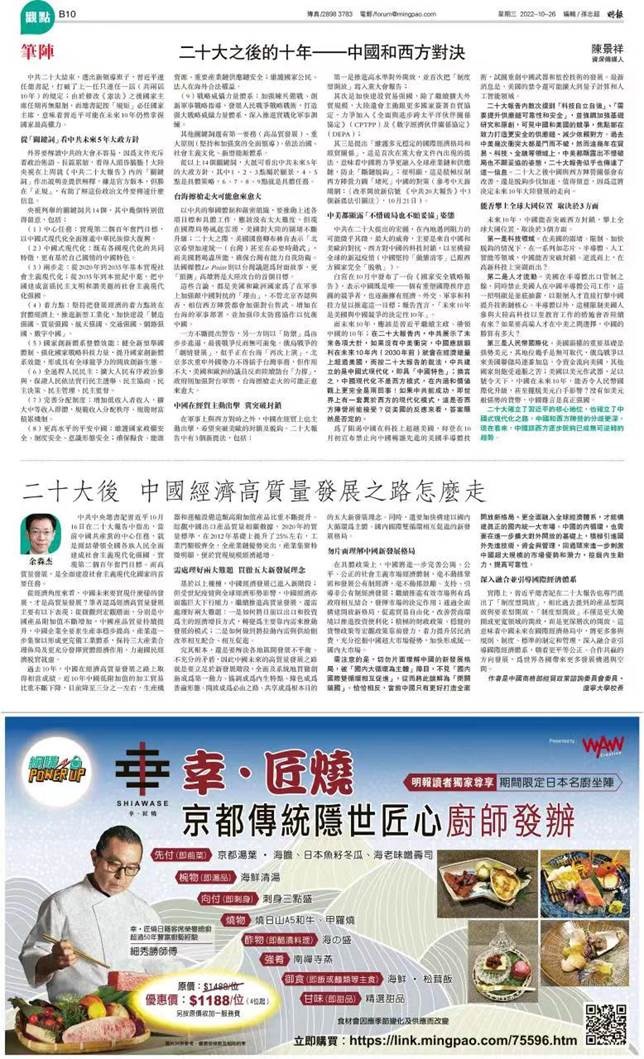Recently, Hong Kong China News Agency interviewed Prof. Yu Miaojie, Deputy Secretary of CPC Committee and President of Liaoning University. Ming Pao Daily News of Hong Kong reported on the interview. The original text and pictures are reproduced as follows:

How will China’s Economy Develop with High Quality after the 20th National Congress
Yu Miaojie
Xi Jinping, General Secretary of the CPC Central Committee, pointed out on October 16th at the 20th National Congress that at present, the central task of the Communist Party of China is to unite and lead the people of all ethnic groups in the country to build a powerful socialist country in an all-round way and achieve the goal of the second 100 years. And high-quality development is the primary task of building a socialist modernized country in an all-round way.
From the economic point of view, what kind of development will China achieve in the future? The author believes that high-quality development is mainly manifested in the following aspects from the micro level to the macro level: the added value of products in China constantly increases, the quality of products in China constantly improves, the total factor productivity of enterprises in China steadily increases, industries are further concentrated to form a more complete industrial system, the rational layout of the three major industries is maintained, and the role of the real economy is given full play, so as to avoid the national economy from being divorced from reality.
In the past 10 years, China has made considerable achievements on the road of high-quality economic development. In recent decade, the proportion of low value-added processing trade in China has been declining, dropping to about 1/3, and the proportion of high value-added products such as production machinery and transportation equipment has been increasing. Looking at the relevant data of China’s export product quality, the quality standard in 2020 has increased by about 25% on the basis of 2012; The industry category is relatively complete, and the advantages of the whole industry chain are outstanding; The characteristics of industrial agglomeration are obvious, which is convenient to realize the increasing scale economy.
Based on the above, China’s economic development has entered a new stage. However, under the influence of the epidemic situation in the century and the global economic situation, China’s economic downturn is also facing enormous pressure. To continue to promote high-quality development, two major problems need to be solved: first, how to change the current mode of economic growth, which is mainly based on exports and investment, into a mode that is mainly driven by domestic demand; Second, how to coordinate and promote domestic demand and supply-side reform.
The fundamental reason is to solve the contradiction of unbalanced and inadequate development among different regions. Therefore, the road of high-quality development in China in the future is to base itself on the new development stage, comprehensively and systematically implement the five new development concepts of innovation as the first power, coordination as the endogenous characteristic, green as the universal form, openness as the only way, and sharing as the fundamental purpose. At the same time, it is necessary to speed up the construction of a new development pattern with the domestic big circulation as the main body and the domestic and international double circulation promoting each other.
In terms of specific policies, China will further improve the open, fair and just socialist market economic system, unswervingly consolidate and develop the public ownership economy, and unswervingly encourage, support and guide the development of the non-public ownership economy; Continue to promote the combination of effective market and promising government, and give play to the decisive role of the market; Promote trade liberalization and improve the business environment to promote investment facilitation by building an all-round pattern of opening up and opening up; The proactive fiscal policy, prudent monetary policy and other macro-policies will exert their efforts to improve residents’ consumption, fully tap the advantages of China’s super-large market, and accelerate the formation of a unified domestic market.
It is important to note that we should not understand the new development pattern of China unilaterally, and be blinded by the “domestic big circulation as the main body” and fail to see the “domestic and international double circulation promoting each other”, thus misinterpreting this as “closing the country to the outside world”. On the contrary, at present, only by building a new pattern of all-round opening up and integrating into the global economic system can China build a truly unified domestic market. China's internal circulation also needs to actively introduce foreign advanced technology, capital and management on the basis of further opening to the outside world, so as to further stimulate China's super-large-scale market advantage and potential, tap endogenous power and improve its reliability.
Actually, Xi Jinping, General Secretary of the CPC Central Committee, put forward the “institutional opening” on the report of 20th National Congress. Compared with the product opening and factor opening mentioned in the past, the “institutional opening” is not only an opening in a wider scope or field, but a deeper opening. This means that in the future, China will participate more in the formulation and management of rules, systems and standards in the international economic structure, deeply integrate and guide the development of the international economic system in the direction of equality, justice, win-win cooperation and bring more development opportunities and space for all countries in the world. (The author is the President of Liaoning University and a member of the Economic and Trade Policy Advisory Committee of the Ministry of Commerce of China)
